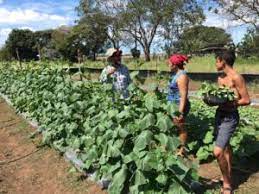Through the “Huertas Caseras” project, 63 families from seven Guanacaste communities will grow vegetables on their land for self-consumption and commercialization. The initiative of the Association Growing Together seeks to reactivate the economy of these families, after they lost their jobs due to the Pandemic.
In this second phase of the project, the participants will receive training on how to cultivate in a sustainable way, that is, with an environmentally friendly technique, which in the long term will not damage the soils with agrochemicals and without the use of transgenic seeds.
For example, families will learn to use drip irrigation and fertigation technology, as well as an advanced technical seed package that will allow them to obtain high quality products that will even have 45% less chemical load from pesticides.

“With the first stage, a lot of hope was generated in the inhabitants, because they saw that this is a profitable business opportunity in tough times of Pandemic and even post-Pandemic. For this reason we launched a second stage, which we hope will have the same success as the first”, explained Elsa Bonilla, director of the Growing Together Association. Officials of the Ministry of Agriculture and Livestock (MAG) will be in charge of supervising the families in this learning process.
More than 21,000 kilos of vegetables were grown in the first phase
During the initial stage of “Huertas Caseras” 21,137 kilos of vegetables were grown on 34 plots of land. These products were marketed on the producers’ social networks, in their communities, to dealers in the Chorotega market, sodas and restaurants.
“My husband and I are dedicated to transporting students from a private school and workers from a hotel store, and with the Pandemic we were left unemployed, with no income. Through a friend I found out about this project and undoubtedly called; Thank God I was able to participate. The only thing I had planted are the plants in my garden, but this project has kept us so busy that it has been an excellent therapy on an emotional level and truly an economic relief in the hardest moments,” said Verania Chavarría, a neighbor and farmer from Cheek.
In both the first and second stages, the harvest plan consists of 30% of minor products, such as: lettuce, coriander, squash, butter, radishes, hemstitches and chives; and 70% of major products: tomato, cucumber, onion and chili, which are the most consumed in Guanacaste.
The project managed to reach the cantons of Carrillo and Liberia, in ten communities: El Triunfo, Guardia, Paso Tempisque, Palmira, La Libertad, Corralillos, Sardinal, San Blas, Artola and Comunidad.
